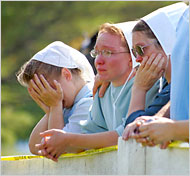 Richard Weaver was a semi-professional boxer in his younger days. Fighting, after drinking, just came natural to him. After his conversion to Jesus Christ he tried to live out this different life that Christ had given him, but one night he fell in to his old ways. He beat up a man who had insulted a girl. Feeling that having once fallen, he might as well be guilty of more sin than less, he got drunk. Then he went and broke the jaw of another man who had recently challenged him to a fight and who had taunted him for being a Christian coward.
I tell you this about Richard Weaver to show the contrast when he eventually learned meekness from his Lord. Look for the change of attitude that God gave Weaver as he tells about a later incident that happened in the coal mines where he worked:
Richard Weaver was a semi-professional boxer in his younger days. Fighting, after drinking, just came natural to him. After his conversion to Jesus Christ he tried to live out this different life that Christ had given him, but one night he fell in to his old ways. He beat up a man who had insulted a girl. Feeling that having once fallen, he might as well be guilty of more sin than less, he got drunk. Then he went and broke the jaw of another man who had recently challenged him to a fight and who had taunted him for being a Christian coward.
I tell you this about Richard Weaver to show the contrast when he eventually learned meekness from his Lord. Look for the change of attitude that God gave Weaver as he tells about a later incident that happened in the coal mines where he worked:I went down (into the coal pit) and found a boy crying because a fellow-workman was trying to take his wagon from him by force. I said to him, “Tom, you mustn’t take that wagon.” He swore at me and called me a (Christian) devil . . . “Well,” I said, “let us see whether the devil and you are stronger than the Lord and me.” And the Lord and me proving stronger than the devil and him, he had to get out of the way, or the wagon would have gone over him. So I gave the wagon to the boy. Then Tom said to me, “I’ve got a good mind to smack you on the face.”
“Well,” I said, “if that will do you any good, then go ahead and do it.” So he struck me on the face. I turned the other cheek to him and said, “Strike again.” He struck again and again till he had struck me five times. I turn my cheek for the sixth stroke; but he had turned away cursing. I shouted after him, “The Lord forgive you, for I do; and the Lord save you!”
This was on Saturday, and when I went home from the coal pit, my wife saw my face was swollen, and asked what was the matter with it. I said, “I’ve been fighting, and I’ve given a man a good thrashing.” She burst out weeping and said, “O Richard, what made you fight?” Then I told her all about it, and she thanked the Lord that I had not struck back. But the Lord had struck, and His blows have more effect than man’s.
Monday came. The devil began to tempt me saying, “The other men will laugh at you for allowing Tom to treat you as he did on Saturday.” I cried, “Get thee behind me Satan,” and went on my way to the coal pit. Tom was the first man I saw. I said “Good morning,” but got no reply. He went down first. When I got down, I was surprised to see him sitting on the wagon-load waiting for me. When I came to him he burst into tears and said, “Richard, will you forgive me for striking you?”
“I have forgiven you,” I said, “ask God to forgive you; the Lord bless you.” I gave him my hand, and we went each to his work. (adapted from William James in God’s Treasure of Virtues).
What an attitude change had taken place in the heart of Richard Weaver. What strength he showed! What courage! What self-control! If we were to give a name to this new attitude he displayed, what would you call it? The Bible calls it meekness. Today Jesus asks us to check our attitudes when He said, “Blessed are the meek, for they will inherit the earth.”
What is meekness? Meekness is not weakness. You are not meek because you are timid. You are not meek because you are fearful. You are not meek because you are shy. You are not meek because you lack self-confidence. The meek are not the doormats of the world. And meekness is also not simply being nice.
Meekness is not a personality trait, it is a fruit of the Holy Spirit according to Galatians 5:23. The fruit of the Spirit is a supernatural quality that God produces in us when we have Jesus living through us and we are controlled by His Spirit.
Meek was the word used to describe a wild stallion which had been broken so a man could ride it. A wild stallion when out of control is a dangerous beast. But once broken and under control he is powerfully useful. The master horseman can control his every movement.
Meekness is when we submit all that we have and are to the control of a master, and in this case the Master is Jesus Christ. Now you may begin to see why Jesus puts the beatitudes in this order. First we must be “poor in spirit” recognizing our spiritual bankruptcy before God. Next we must become broken, to “mourn” over our sinful condition, repenting and finding the forgiveness and comfort from Jesus. When we do this we become new creations in Christ and He comes to live within us through the presence of His Holy Spirit. And to be meek is to live a spirit controlled life. So what does this Spirit controlled life look like? Jesus is the perfect picture of meekness. Jesus says in (Mat 11:29) “Take my yoke upon you, and learn of me; for I am meek and lowly in heart: and you shall find rest for your souls.”
Isaiah says this about our Savior, Jesus:
(Isa 53:7 NIV) He was oppressed and afflicted, yet he did not open his mouth; he was led like a lamb to the slaughter, and as a sheep before her shearers is silent, so he did not open his mouth.
Jesus had all the power in the world as the Son of God. Yet He willingly suffered and died for us. He did not fight back or even defend Himself when He was wrongfully accused. Jesus was meek.
A.W. Tozer once wrote, “The meek man is not a human mouse afflicted with a sense of his own inferiority. Rather he may be in his moral life as bold as a lion and as strong as Samson; but he has stopped being fooled about himself. He has accepted God’s estimate of his own life. He knows he is as weak and helpless as God declared him to be, but he knows at the same time that he is in the sight of God of more importance than angels. In himself, nothing; in God, everything. That is his motto."
How are you doing at being meek?
 I believe the Bible is the inspired word of God. It is the authority for faith and practice in the Christian life. Now you might say—“Okay Richard, I agree that the Bible has been important to Christians, but why should I believe it is more divinely inspired than any other book?” Good question!
I believe the Bible is the inspired word of God. It is the authority for faith and practice in the Christian life. Now you might say—“Okay Richard, I agree that the Bible has been important to Christians, but why should I believe it is more divinely inspired than any other book?” Good question! For 17 years I worked part-time at UPS in addition to being pastor of a small church in Kansas. I would get up at 3:00am and be to work by 4:00am. The work was physically and mentally challenging. The schedule was tight every morning. Within a span of three and a half to four hours our team had to unload, scan, label, sort, and sequentially load about 40,000 packages. Tempers often flared under exhaustion and the time constraints.
For 17 years I worked part-time at UPS in addition to being pastor of a small church in Kansas. I would get up at 3:00am and be to work by 4:00am. The work was physically and mentally challenging. The schedule was tight every morning. Within a span of three and a half to four hours our team had to unload, scan, label, sort, and sequentially load about 40,000 packages. Tempers often flared under exhaustion and the time constraints. 
 I really am thankful to God for making it grow. I know I can’t make it grow. I can plant seeds, water them and watch—but God makes it grow.
I really am thankful to God for making it grow. I know I can’t make it grow. I can plant seeds, water them and watch—but God makes it grow.
 Martin Lloyd-Jones tells the story of a Hindu trader in India who once asked a missionary, "What do you put on your face to make it shine?" With surprise the man of God answered, "I don't put anything on it!" His questioner began to lose patience and said emphatically, "Yes, you do! All of you who believe in Jesus seem to have it. I've seen it in the towns of Agra and Surat, and even in the city of Bombay." Suddenly the Christian understood, and his face glowed even more as he said, "Now I know what you mean, and I will tell you the secret. It's not something we put on from the outside but something that comes from within. It's the reflection of the light of God in our hearts.”
Martin Lloyd-Jones tells the story of a Hindu trader in India who once asked a missionary, "What do you put on your face to make it shine?" With surprise the man of God answered, "I don't put anything on it!" His questioner began to lose patience and said emphatically, "Yes, you do! All of you who believe in Jesus seem to have it. I've seen it in the towns of Agra and Surat, and even in the city of Bombay." Suddenly the Christian understood, and his face glowed even more as he said, "Now I know what you mean, and I will tell you the secret. It's not something we put on from the outside but something that comes from within. It's the reflection of the light of God in our hearts.” On the morning of October 2, 2006, a troubled milkman named Charles Carl Roberts barricaded himself inside the West Nickel Mine Amish School, ultimately murdering five young girls and wounding six others. Roberts committed suicide when police arrived on the scene. It was a dark day for the Amish community of West Nickel Mines, but it was also a dark day for Marie Roberts—the wife of the gunman—and her two young children.
On the morning of October 2, 2006, a troubled milkman named Charles Carl Roberts barricaded himself inside the West Nickel Mine Amish School, ultimately murdering five young girls and wounding six others. Roberts committed suicide when police arrived on the scene. It was a dark day for the Amish community of West Nickel Mines, but it was also a dark day for Marie Roberts—the wife of the gunman—and her two young children. Welcome,
Welcome,  Richard Weaver was a semi-professional boxer in his younger days. Fighting, after drinking, just came natural to him. After his conversion to Jesus Christ he tried to live out this different life that Christ had given him, but one night he fell in to his old ways. He beat up a man who had insulted a girl. Feeling that having once fallen, he might as well be guilty of more sin than less, he got drunk. Then he went and broke the jaw of another man who had recently challenged him to a fight and who had taunted him for being a Christian coward.
Richard Weaver was a semi-professional boxer in his younger days. Fighting, after drinking, just came natural to him. After his conversion to Jesus Christ he tried to live out this different life that Christ had given him, but one night he fell in to his old ways. He beat up a man who had insulted a girl. Feeling that having once fallen, he might as well be guilty of more sin than less, he got drunk. Then he went and broke the jaw of another man who had recently challenged him to a fight and who had taunted him for being a Christian coward.  What if I told you that those who have nothing, and know they have nothing are the happiest people in the world? Jesus said something like that.
What if I told you that those who have nothing, and know they have nothing are the happiest people in the world? Jesus said something like that. Name eight things that would make you happy. If God said to you today, "Choose eight things that you feel would make your life happy and I will give them to you," what would you choose? Would it be to win the lottery or to be wealthy? Would you ask for healing and good health for you or your loved ones? Would you ask for that job or that promotion you’ve been wanting? What eight things would you choose?
Name eight things that would make you happy. If God said to you today, "Choose eight things that you feel would make your life happy and I will give them to you," what would you choose? Would it be to win the lottery or to be wealthy? Would you ask for healing and good health for you or your loved ones? Would you ask for that job or that promotion you’ve been wanting? What eight things would you choose?





